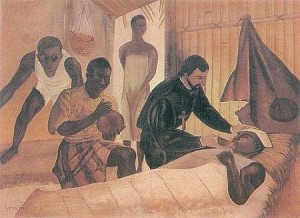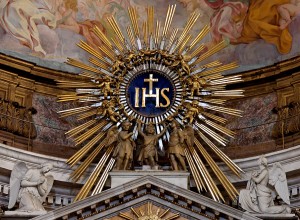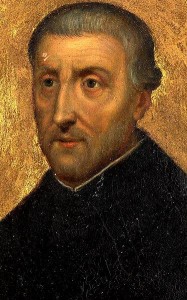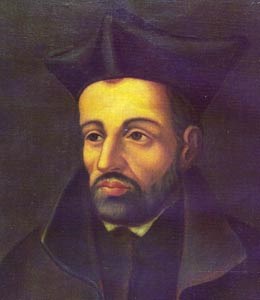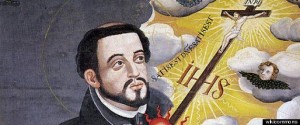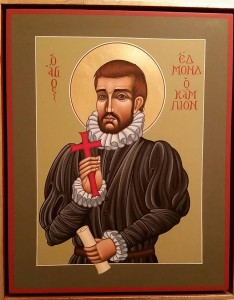 Today, particularly on the Jesuit ordo, is the Feast of Saints Edmund Campion, Robert Southwell, and the English Jesuit martyrs. These men of God were tortured and executed for their faith in Jesus Christ and their adherence to the authority of the Roman Pontiff in Elizabethan England.
Today, particularly on the Jesuit ordo, is the Feast of Saints Edmund Campion, Robert Southwell, and the English Jesuit martyrs. These men of God were tortured and executed for their faith in Jesus Christ and their adherence to the authority of the Roman Pontiff in Elizabethan England.
One of the famous texts from this era is “Campion’s Brag,” Saint Edmund’s clear and undisputed defense of the Catholic faith.
Through the intercession let us pray for the Catholic Church in the UK, and in the USA.
“The expense is reckoned, the enterprise is begun; it is of God; it cannot be withstood.”
To the Right Honourable, the Lords of Her Majesty’s Privy Council:
Whereas I have come out of Germany and Bohemia, being sent by my superiors, and adventured myself into this noble realm, my dear country, for the glory of God and benefit of souls, I thought it like enough that, in this busy, watchful, and suspicious world, I should either sooner or later be intercepted and stopped of my course.
Wherefore, providing for all events, and uncertain what may become of me, when God shall haply deliver my body into durance, I supposed it needful to put this in writing in a readiness, desiring your good lordships to give it your reading, for to know my cause. This doing, I trust I shall ease you of some labour. For that which otherwise you must have sought for by practice of wit, I do now lay into your hands by plain confession. And to the intent that the whole matter may be conceived in order, and so the better both understood and remembered, I make thereof these nine points or articles, directly, truly and resolutely opening my full enterprise and purpose.
i. I confess that I am (albeit unworthy) a priest of the Catholic Church, and through the great mercy of God vowed now these eight years into the religion [religious order] of the Society of Jesus. Hereby I have taken upon me a special kind of warfare under the banner of obedience, and also resigned all my interest or possibility of wealth, honour, pleasure, and other worldly felicity.
ii. At the voice of our General, which is to me a warrant from heaven and oracle of Christ, I took my voyage from Prague to Rome (where our General Father is always resident) and from Rome to England, as I might and would have done joyously into any part of Christendom or Heatheness, had I been thereto assigned.
iii. My charge is, of free cost to preach the Gospel, to minister the Sacraments, to instruct the simple, to reform sinners, to confute errors—in brief, to cry alarm spiritual against foul vice and proud ignorance, wherewith many of my dear countrymen are abused.
iv. I never had mind, and am strictly forbidden by our Father that sent me, to deal in any respect with matter of state or policy of this realm, as things which appertain not to my vocation, and from which I gladly restrain and sequester my thoughts.
v. I do ask, to the glory of God, with all humility, and under your correction, three sorts of indifferent and quiet audiences: the first, before your Honours, wherein I will discourse of religion, so far as it toucheth the common weal and your nobilities: the second, whereof I make more account, before the Doctors and Masters and chosen men of both universities, wherein I undertake to avow the faith of our Catholic Church by proofs innumerable—Scriptures, councils, Fathers, history, natural and moral reasons: the third, before the lawyers, spiritual and temporal, wherein I will justify the said faith by the common wisdom of the laws standing yet in force and practice.
vi. I would be loath to speak anything that might sound of any insolent brag or challenge, especially being now as a dead man to this world and willing to put my head under every man’s foot, and to kiss the ground they tread upon. Yet I have such courage in avouching the majesty of Jesus my King, and such affiance in his gracious favour, and such assurance in my quarrel, and my evidence so impregnable, and because I know perfectly that no one Protestant, nor all the Protestants living, nor any sect of our adversaries (howsoever they face men down in pulpits, and overrule us in their kingdom of grammarians and unlearned ears) can maintain their doctrine in disputation. I am to sue most humbly and instantly for combat with all and every of them, and the most principal that may be found: protesting that in this trial the better furnished they come, the better welcome they shall be.
vii. And because it hath pleased God to enrich the Queen my Sovereign Lady with notable gifts of nature, learning, and princely education, I do verily trust that if her Highness would vouchsafe her royal person and good attention to such a conference as, in the second part of my fifth article I have motioned, or to a few sermons, which in her or your hearing I am to utter such manifest and fair light by good method and plain dealing may be cast upon these controversies, that possibly her zeal of truth and love of her people shall incline her noble Grace to disfavour some proceedings hurtful to the realm, and procure towards us oppressed more equity.
viii. Moreover I doubt not but you, her Highness’ Council, being of such wisdom and discreet in cases most important, when you shall have heard these questions of religion opened faithfully, which many times by our adversaries are huddled up and confounded, will see upon what substantial grounds our Catholic Faith is builded, how feeble that side is which by sway of the time prevaileth against us, and so at last for your own souls, and for many thousand souls that depend upon your government, will discountenance error when it is bewrayed [revealed], and hearken to those who would spend the best blood in their bodies for your salvation. Many innocent hands are lifted up to heaven for you daily by those English students, whose posterity shall never die, which beyond seas, gathering virtue and sufficient knowledge for the purpose, are determined never to give you over, but either to win you heaven, or to die upon your pikes. And touching our Society, be it known to you that we have made a league—all the Jesuits in the world, whose succession and multitude must overreach all the practice of England—cheerfully to carry the cross you shall lay upon us, and never to despair your recovery, while we have a man left to enjoy your Tyburn, or to be racked with your torments, or consumed with your prisons. The expense is reckoned, the enterprise is begun; it is of God; it cannot be withstood. So the faith was planted: So it must be restored.
ix. If these my offers be refused, and my endeavours can take no place, and I, having run thousands of miles to do you good, shall be rewarded with rigour. I have no more to say but to recommend your case and mine to Almighty God, the Searcher of Hearts, who send us his grace, and see us at accord before the day of payment, to the end we may at last be friends in heaven, when all injuries shall be forgotten.
(Icon by William Hart McNichols, enthroned outside the St. Edmund Campion Chapel in America House, New York.)
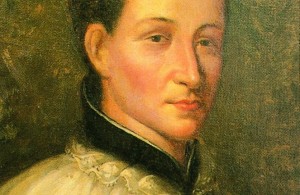 The day after to the liturgical and civil observance of Saint Valentine (bishop and martyr) we have one of the great proponents of Divine Love, the Jesuit Spiritual director of Saint Margaret Mary of Alocoque, Saint Claude la Colombiere (1641-1682). The example of Saint Valentine needs to be followed; one of his 17th century disciples was a Jesuit who knew first hand the meaning of what it means to follow God’s approach: love.
The day after to the liturgical and civil observance of Saint Valentine (bishop and martyr) we have one of the great proponents of Divine Love, the Jesuit Spiritual director of Saint Margaret Mary of Alocoque, Saint Claude la Colombiere (1641-1682). The example of Saint Valentine needs to be followed; one of his 17th century disciples was a Jesuit who knew first hand the meaning of what it means to follow God’s approach: love.
